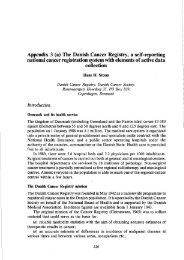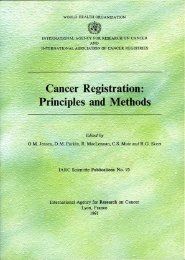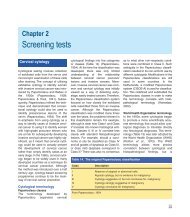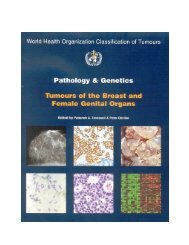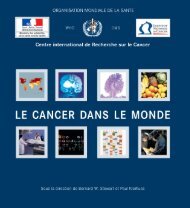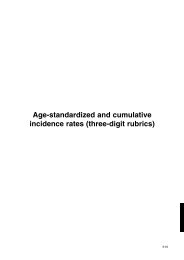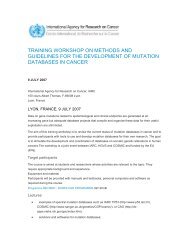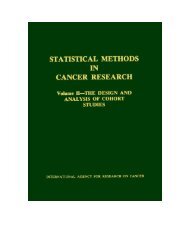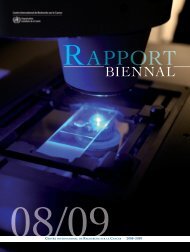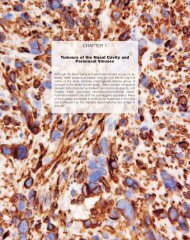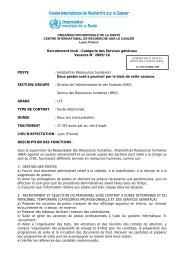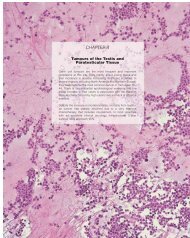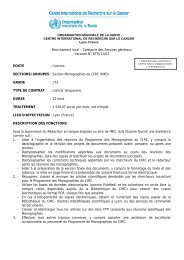world cancer report - iarc
world cancer report - iarc
world cancer report - iarc
You also want an ePaper? Increase the reach of your titles
YUMPU automatically turns print PDFs into web optimized ePapers that Google loves.
cer incidence following cure of infection;<br />
the higher the reduction, the more costeffective<br />
screening becomes [5,6].<br />
Factors that influence screening strategies<br />
are the prevalence of H. pylori in the<br />
population, and the need to focus upon<br />
older persons. The paradox is that the<br />
greatest benefit will be potentially gained<br />
by younger persons, in whom screening<br />
and treatment is less cost-effective. Due<br />
to associated comorbidity, the benefit in<br />
terms of life expectancy becomes negligible<br />
in older persons. Published analyses<br />
suggest favourable scenarios if screening<br />
and curing H. pylori among persons at a<br />
high risk of stomach <strong>cancer</strong> between the<br />
ages of 40 and 50 years were to reduce<br />
the risk of <strong>cancer</strong> by at least 30% [6].<br />
However, in a high-risk population, most<br />
H. pylori-infected persons develop atrophic<br />
gastritis by age 40 and there is no evidence<br />
as to whether curing the infection<br />
at that stage will reduce the risk of <strong>cancer</strong>.<br />
Nonetheless, curing H. pylori infection<br />
gives the additional benefit of eliminating<br />
duodenal and gastric ulcer, a type of lymphoma<br />
associated with this condition, and<br />
up to 10% of cases of dyspepsia, as well as<br />
preventing transmission of the infection.<br />
There is considerable interest in the development<br />
of a vaccine to prevent H. pylori<br />
infection and possibly also to cure active<br />
infections [7,8]. Proof of concept has been<br />
obtained in animal experiments, candidate<br />
vaccines have been identified and<br />
clinical trials are poised to begin. An effective<br />
vaccine is the only practical method<br />
of eliminating H. pylori infection in developing<br />
countries where the incidence of<br />
the infection and the burden of disease<br />
are the greatest.<br />
The role of dietary factors<br />
Relevant dietary risk factors have been<br />
extensively investigated in observational<br />
epidemiological studies. Most studies of<br />
dietary factors in stomach <strong>cancer</strong><br />
preceded the discovery of the role of H.<br />
pylori. Nevertheless, diet is thought to be<br />
a critical factor in the progression of<br />
superficial gastritis to chronic atrophic<br />
gastritis among persons infected with H.<br />
pylori. Several observations have been<br />
made that indicate a preventive role for<br />
176 Prevention and screening<br />
specific food items [9,10]. An inverse relationship<br />
between stomach <strong>cancer</strong> and<br />
regular dietary intake of fresh vegetables<br />
and fruits has been observed in many<br />
case-control studies as well as prospective<br />
studies conducted in several countries.<br />
Individuals eating 5-20 servings of<br />
fruits and 5-20 servings of raw vegetables<br />
every week reduce their risk of stomach<br />
<strong>cancer</strong> by almost half [11]. In addition, allium<br />
vegetables and onions have been negatively<br />
associated with stomach <strong>cancer</strong> in<br />
several countries. Fruits and vegetables<br />
are sources of many antioxidants, such as<br />
α-tocopherol, β-carotene, vitamin E, and<br />
vitamin C. However, a study in Finland<br />
found no impact of dietary supplementation<br />
with α-tocopherol and β-carotene for<br />
five years on the occurrence of neoplastic<br />
changes of the stomach in older male<br />
smokers with atrophic gastritis [12].<br />
Intake of vitamin C is associated with an<br />
approximately 50% decrease in the risk of<br />
stomach <strong>cancer</strong> [11,13], although supplementation<br />
with vitamin C does not seem<br />
to reduce incidence among patients with<br />
pre-existing intestinal metaplasia.<br />
Prolonged consumption of foods rich in<br />
salted, pickled, and smoked products<br />
increases the risk of stomach <strong>cancer</strong>.<br />
These foods have high salt content and<br />
nitrates and low levels of antioxidants due<br />
to storage for a long time at room temperature<br />
before consumption. Excessive<br />
dietary salt has been associated with gastric<br />
atrophy in animals and probably accelerates<br />
gastric atrophy in humans. In<br />
Japan, the correlation between salt intake<br />
and stomach <strong>cancer</strong> follows the gradient<br />
of salt intake. Similar correlations<br />
between salt intake and stomach <strong>cancer</strong><br />
have been observed in other countries.<br />
Increase in the per capita consumption of<br />
fruits and vegetables and a concomitant<br />
decrease in salted foods have paralleled<br />
the decline in stomach <strong>cancer</strong> mortality in<br />
Japan. Foods rich in carbohydrates have<br />
been associated with an increased risk of<br />
stomach <strong>cancer</strong>. However, consumption<br />
of carbohydrate-rich foods overlaps with<br />
high dietary salt intake and reduced intake<br />
of fruits and vegetables. Despite the implications<br />
of certain animal studies, foods<br />
rich in nitrates, nitrites and secondary<br />
amines have not been shown to be independent<br />
significant risks. The spread of<br />
refrigeration has been associated with the<br />
decrease in stomach <strong>cancer</strong>, which probably<br />
relates to the replacement of more traditional<br />
methods of food preservation<br />
such as salting and pickling and making<br />
fresh fruits and vegetables more available<br />
all year round. However, there have been<br />
no intervention trials showing that a specific<br />
dietary modification reduces the incidence<br />
of stomach <strong>cancer</strong>.<br />
Secondary prevention: screening<br />
Screening for stomach <strong>cancer</strong> has been<br />
practised in Japan since 1963. Annual<br />
screening using seven-film photofluorography<br />
examination or endoscopy (Box:<br />
Screening for stomach <strong>cancer</strong> in Japan,<br />
p177) has been recommended for people<br />
of age 50 and above, although this is a<br />
matter of some controversy. The false negative<br />
rate has been <strong>report</strong>ed to be up to<br />
19% for gastroscopy and up to 40% for<br />
photofluorography. Screening in Japan has<br />
increased the proportion of tumours<br />
detected at an early stage to approximately<br />
50%. Prognosis for stomach <strong>cancer</strong><br />
patients identified by screening may be<br />
better than for those identified by other<br />
means [14]. Certainly, detection of the<br />
<strong>cancer</strong> at an early stage improves chances<br />
of survival; the five-year survival rate following<br />
surgical treatment for early stomach<br />
<strong>cancer</strong> is higher (99.2%) than for nonearly<br />
stomach <strong>cancer</strong> (48.5%). The overall<br />
five-year survival increased from 20% in<br />
1965 to 40% in 1992. The five-year survival<br />
rate for stomach <strong>cancer</strong> in the USA and<br />
other Western countries remained stable<br />
at 20% during the same time period.<br />
Screening is the most likely explanation<br />
for the improved survival but a reduction<br />
in incidence is not attributable to screening.<br />
The Ministry of Health and Welfare of<br />
Japan determined that a programme of<br />
population-based screening by barium<br />
meal included only 7-13% of the population<br />
over 40. Therefore, it may be concluded<br />
that the official mass screening<br />
programme in Japan detects only a small<br />
proportion of stomach <strong>cancer</strong>s (10-15%).<br />
The remaining cases are identified symptomatically.<br />
Screening for stomach <strong>cancer</strong>



